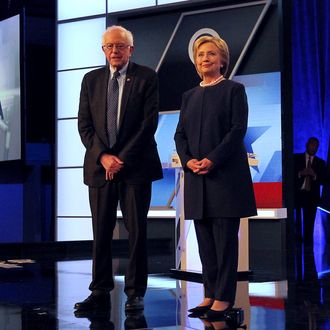
One of the iron convictions of American politics is that Democratic politicians like to pander to the party base by opposing or deploring international trade agreements, but then support them if they happen to become president. And thus it is widely assumed that Hillary Clinton, whose husband’s administration secured approval of some of the most controversial trade agreements in U.S. history, is flip-flopping with her opposition to the Trans-Pacific Partnership Obama is promoting, and will surely flip-flop again right back into the free-trade camp if elected.
Now, it is indeed an underappreciated fact that every Democratic president dating back to Martin Van Buren has supported trade liberalization. This includes presidents deeply revered by today’s populists and democratic socialists, like FDR, who proposed unilateral tariff concessions to the Europeans at the end of World War II to help rebuilt their economies. (And for that matter, the greatest Democratic populist of them all, William Jennings Bryan, supported free trade more consistently than any other policy throughout his long career.)
But in the late 20th and early 21st century it has gone without saying that Democratic free-traders needed a complementary set of domestic policies to cushion the dislocations associated with expanded trade, and to ameliorate the distributional distortions that made exposure to global competition a winning proposition for some Americans and a disaster for others. Bill Clinton, in fact, sometimes called such policies a matter of “expanding the winner’s circle”: trade adjustment assistance, retraining opportunities, and even outright redistribution of wealth via progressive taxes.
Without question, some progressives have scoffed at these compensatory policies as scraps from the table of trade’s corporate beneficiaries, not offsetting the damage done by agreements like NAFTA, and far less effective than not promoting globalization in the first place or crafting agreements with tough safeguards against U.S. worker interests. But however they are assessed, such policies do matter.
And as Paul Krugman notes today, such policies cannot be enacted against the obstruction of congressional Republicans:
[A]s Mark Kleiman sagely observes, the conventional case for trade liberalization relies on the assertion that the government could redistribute income to ensure that everyone wins — but we now have an ideology utterly opposed to such redistribution in full control of one party, and with blocking power against anything but a minor move in that direction by the other.
Ripping up the trade agreements we already have would, again, be a mess, and I would say that Sanders is engaged in a bit of a scam himself in even hinting that he could do such a thing. Trump might actually do it, but only as part of a reign of destruction on many fronts.
But it is fair to say that the case for more trade agreements — including TPP, which hasn’t happened yet — is very, very weak. And if a progressive makes it to the White House, she should devote no political capital whatsoever to such things.
Presumably at some point, either because of Democratic electoral victories or an end to “the fever” of extremism afflicting Republicans, it might again be possible to offer and enact a balanced agenda of trade liberalization integrated with measures to make its effects benign. But “no more until then” is an intellectually and morally respectable position, and we should not assume it is being advanced by pols like Hillary Clinton with fingers crossed.






























